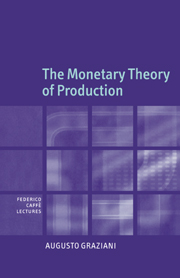Book contents
4 - The creation of bank money
Published online by Cambridge University Press: 03 July 2009
Summary
Loans make deposits
As already noted, the circulation approach rejects the idea that deposits make loans, an idea that Schumpeter already considered an old prejudice. In the circulation approach the opposite conception is adopted, namely that loans make deposits.
The ‘old prejudice’ is based on the assumption that, without a previous collection of deposits, the banking system would be unable to make any loan since, when making loans, a bank makes use of previously collected deposits. Simple considerations of banking technique show the inconsistency of this idea. An agent opening a bank deposit doesn't lose his own liquidity, since he is usually able to make use of his deposit as a means of payment at any moment and without notice. At the same time a bank, when making a new loan, is granting additional liquidity to an agent without subtracting any liquidity from any of its own depositors. Therefore, as Hawtrey concluded, when a bank makes a loan to a customer, it is not transmitting liquidity from one agent to another one but creating new liquidity (Hawtrey 1931: 548; Schumpeter 1934 [1911], chapter 3, part I).
In a pure credit economy, in which the government sector is assumed to be absent, the principle that loans make deposits does not require any special explanation. It is in fact self-evident that if loans granted by commercial banks were totally absent, no agent would be able to make any deposit for absolute lack of liquidity.
- Type
- Chapter
- Information
- The Monetary Theory of Production , pp. 82 - 95Publisher: Cambridge University PressPrint publication year: 2003



